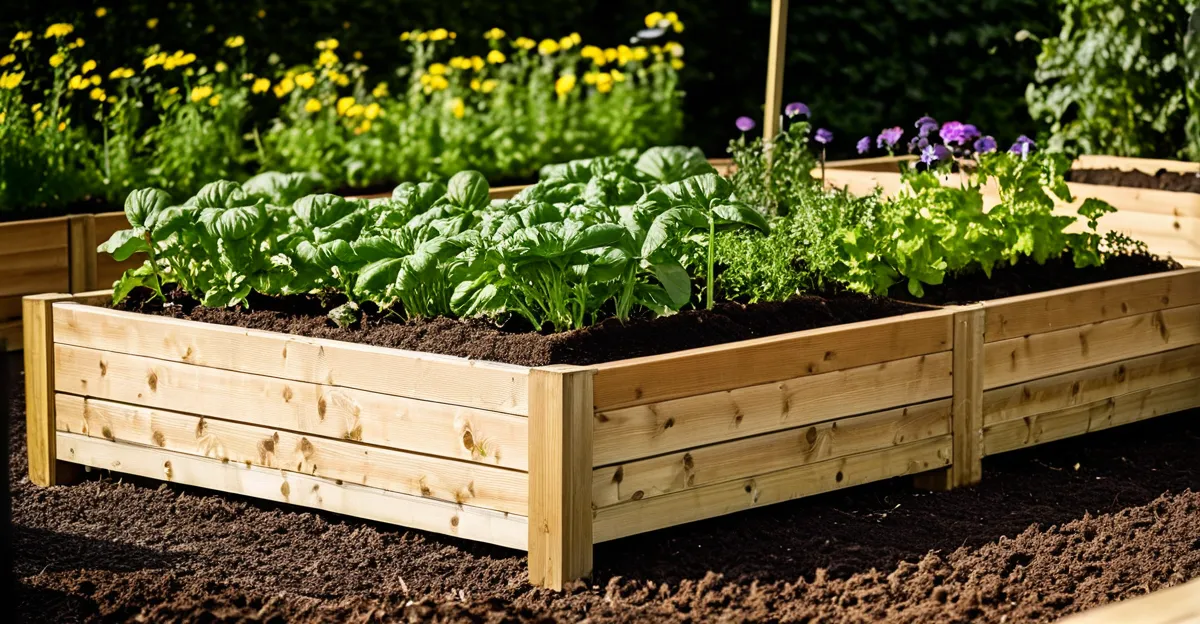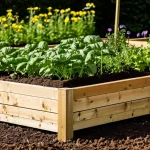Key benefits of raised beds for UK gardeners
Raised beds offer several raised bed advantages UK gardeners appreciate, especially given the region’s often challenging gardening conditions. One primary benefit is improved soil drainage. The UK’s frequent rain can lead to waterlogged soil, which hampers plant growth. Raised beds help by elevating soil above the natural ground level, allowing excess water to drain away more effectively. This feature is crucial in many parts of the UK, where heavy rainfall can otherwise saturate garden soil.
Another significant advantage is the ability to enhance and control soil quality. Many UK gardeners face heavy clay or acidic soils that can be difficult for growing vegetables or flowers. With raised beds UK gardening becomes more manageable because gardeners can fill the beds with carefully selected, nutrient-rich soil mixes tailored to their plants’ needs. This control over soil composition leads to healthier, more productive gardens.
Also to read : How Can You Maximize Your Home and Garden Space Efficiently?
Lastly, raised beds help reduce physical strain, making gardening accessible and enjoyable. Their height eliminates the need to bend or kneel excessively. This is especially beneficial for older gardeners or those with mobility issues, providing easier access and encouraging more frequent garden maintenance and care.
Together, these raised bed advantages UK gardeners experience make raised beds a smart choice for improving productivity and comfort in UK gardens.
Also to see : How Can Smart Home Technology Transform Your UK Garden?
Raised beds and UK climate challenges
Understanding how raised beds meet the demands of the UK’s variable garden weather
Raised beds are a smart solution for gardeners dealing with the complexities of the UK climate. One major advantage of raised beds UK climate conditions embrace is their ability to extend the growing season. By elevating the soil, raised beds warm up faster than ground-level beds, allowing plants to emerge earlier in spring and thrive longer into autumn. This is essential in the UK where colder temperatures can limit growth periods.
Another key benefit is how raised beds help protect plants UK gardeners worry about, especially in regions plagued by heavy clay or compacted soils. Elevated beds provide improved soil structure by allowing gardeners to fill them with a carefully chosen soil mix that drains quickly, unlike the often dense and poorly draining native soils. This quick-draining characteristic is crucial for maintaining plant health in fluctuating UK garden weather raised bed environments experience, which frequently oscillate between wet and dry spells.
Moreover, raised beds play a vital role in minimising waterlogging during the UK’s wet weather. Surplus rainwater can easily saturate the soil in traditional beds, leading to root rot and other problems. Raised beds solve this by improving drainage and preventing water from pooling around plant roots. This protection not only safeguards plants but also eases maintenance efforts through better soil aeration and reduced compaction.
In essence, raised beds UK gardeners adopt effectively balance warmth, drainage, and soil quality to overcome the challenges posed by the typical UK garden weather raised bed setups must endure. Their adaptability significantly benefits plant health and productivity throughout the growing season.
Easier weed and pest management
Raised beds offer significant advantages in managing weed growth and protecting plants from common pests in the UK. Because the soil in raised beds is contained and carefully controlled, it is less prone to harboring weed seeds compared to traditional ground beds. This containment allows gardeners to use higher-quality, weed-free soil mixes, which drastically reduce the number of unwanted plants competing with crops.
When it comes to pest protection in UK gardening, raised beds provide better barriers against slugs, snails, and other frequent garden nuisances. The elevated structure makes it easier to install physical barriers or deterrents such as copper tape or slug collars, which are much harder to apply effectively in the ground. Raised beds also improve drainage and air flow, creating less hospitable environments for pests that thrive in damp, compacted soil.
In the debate of raised beds vs ground beds in the UK, the controlled environment of raised beds generally results in fewer pest and weed problems, making upkeep simpler and less time-consuming. This means gardeners can spend less time battling pests and more time cultivating healthy plants. For practical steps and expert advice on weed control and pest protection in raised beds, visiting trusted resources like the RHS website can provide valuable guidance.
Flexibility and accessibility for every UK gardener
Small space gardening UK has become increasingly popular, and raised bed design UK offers the perfect solution for many gardeners seeking flexibility and accessibility. These raised beds can be customised easily to suit individual needs, especially for those with mobility challenges or limited space. By adjusting the height of the beds, gardeners can avoid bending or kneeling, which makes gardening more comfortable and accessible for everyone.
Raised beds are ideal for accessible gardening UK, as they fit well in various environments, including small gardens, patios, and allotments. The design can be tailored to maximise planting space while respecting the constraints of urban or compact outdoor areas. For instance, narrower beds allow for easy reaching across, which is essential when space is tight.
Materials used for raised beds in the UK often focus on durability, sustainability, and ease of construction. Timber is a common choice because it is robust and readily available, but some gardeners opt for long-lasting alternatives such as recycled plastic or metal. This choice impacts both maintenance effort and environmental footprint, crucial considerations for many gardeners committed to sustainable practices.
Overall, the adaptability of raised bed design UK ensures that gardening remains an enjoyable and practical hobby regardless of space or physical ability, making accessible gardening UK a reality for all.
Soil and crop health benefits in UK gardens
Understanding how to maintain healthy soil in raised beds UK is vital for thriving gardens. One key practice is crop rotation UK raised beds, which involves changing the types of crops planted in a specific bed each season. This technique helps prevent nutrient depletion by alternating plants with different nutrient requirements. For example, following nitrogen-fixing legumes with leafy greens replenishes soil nitrogen, improving overall soil fertility.
Another important aspect is managing soil structure UK gardening to avoid compaction and promote aeration. Raised beds naturally improve drainage and looseness compared to in-ground gardening, but care must be taken to avoid over-tilling or compressing the soil during planting. Well-aerated soil encourages root growth and microbial activity, which are essential for healthy crops.
Customizing your soil mix based on crop needs is also beneficial. UK gardens often face regional soil challenges such as heavy clay or sandy soils. Adjusting the raised bed soil with organic matter or sand helps tailor conditions for specific plants like root vegetables or brassicas. A well-adapted soil mix ensures better nutrient availability and moisture retention, contributing to robust crop growth and garden success.



